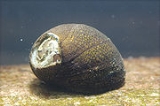The gender of Clithon Montfort, 1810 is neuter. Montfort didn't specify the gender. The specific name of the type species, Nerita corona Linnaeus, is a noun in apposition (Latin corona - a crown) and so does not indicate gender. Montfort indicated that the name was [from the] "Latin Clithon" but this word does not appear to exist in either Latin or Greek (According to Agassiz 1842, Nomina systematica generum molluscorum, Clithon is a proper name (in Greek) but this does not indicate the gender). Therefore the gender of Clithon is determined by the ending -on of its name and is neuter (International Code of Zoological Nomenclature, Article 30.2.4). So Clithon species with adjectival specific names should have a neuter ending e.g. C. oualinense, C. retropictum, C. squarrosum, C. pisiforme.
replied to: stracey000
Replied to: The gender of Clithon Montfort, 1810 is neuter. Montfort didn't specify...
Have you heard anything about the possible gender of Clithon in the Greek language since your posting?
Thanks,
Harry G. Lee, MD
Jacksonville, FL
replied to: HGLee
Replied to: Have you heard anything about the possible gender of Clithon in...
Hi Harry.
Only one quick sarcastic reply so far, probably meant as a joke.
The last article on Indo-Pacific nerites that I saw said something along the lines that the author was going to follow the general trend of regarding Clithon as masculine.
As the matter of usage doesn't apply to the gender of genera it's a good idea to decide the correct gender and start using it. I haven't heard or read of any argument as to why it should be masculine, so I suggest quoting the argument I gave and treat Clithon as neuter.
Steve Tracey
ICZN Secretariat
London UK
replied to: stracey000
Replied to: Hi Harry.
Only one quick sarcastic reply so far, probably meant...
Dear Steve,
I should have expected that you weren't shooting from the hip on this one.
My friend, Tom Eichhorst, is preparing a monograph on the Neritidae and has hypothesized that Clithon is based on the Greek epic hero Clytos, keeper of Alexander the Great's horses. He and I have discussed this recently. If it were "Clythos," I would be a lot more inclined to side with Tom (masculine) as he pointed out that Montfort celebrated Greek historical and mythological characters with generic eponyms.
I'll see that Tom has access to this exchange.
Thanks,
Harry
replied to: HGLee
Replied to: Dear Steve,
I should have expected that you weren't shooting...
It's me again, Steve,
The following paragraph is what I penned for a rant to Conch-L minutes before I discovered you intial posting to the Clithon site:
"The literature is quite inconsistent with the gender of Clithon, but its author treated it as "Le Clithon" implying masculine (Montfort, 1810: 327-328; see link below). The only species he treated, Clithon corona, was translated as "Clithon couronné" implying (1) again, masculine gender but (2) adjectivization of "corona," normally a noun in Latin, to the feminine gender. Interestingly Montfort quite frequently changed the terminations of established genera of feminine gender to masculine (e.g., Natica to Naticus, Ampullaria to Ampullarius, Janthina to Janthinus, Turritella to Turritellus to cite just a few). Given the ambiguities involved coupled with Montfort's unusual generic gender-bending, think it reasonable to conclude that the gender of Clithon cannot be inferred from its original description.
"Montfort, D. de, 1810. Conchyliologie systématique, et classification méthodique de coquilles Conchyliologie Systématique vol 2 (of 2). F. Schoell, Paris. [iii] + 676 pp. [the server rejected my libk to the digitized version of this work - in BHL]
Thought you might be interested,
Harry
replied to: HGLee
Replied to: It's me again, Steve,
The following paragraph is what I...
I did not expect to find more than a couple of people ever interested in the gender of a nerite genus, so this discussion has been quite a lot of fun to follow. I ran into the problem of the gender of Montfort's Clithon almost a decade ago. After a number of discussions with many folks I was pretty much stuck with "usage" (which as was pointed out does not factor in with genera) or the "on" ending (less then reliable as Montfort did not pay attention to such). Someone then suggested the Macedonian general Clytos as the origination of the name, pointing out that Montfort made use of many other Greek nouns and historical personages. So I went with the masculine gender for Clithon. As I told Harry, I am always willing to change - reluctant, but willing. If neither of you think the Clytos argument has merit, then we will have to fall back to the ending "on." Or maybe a coin toss?
Tom Eichhorst (becoming ever more confused by nerites)


